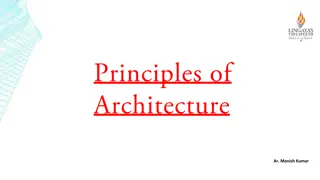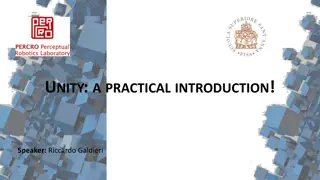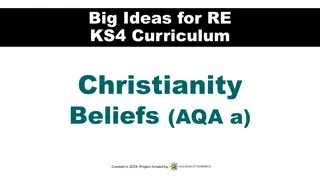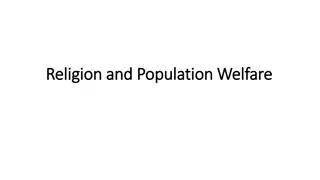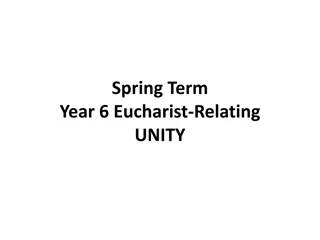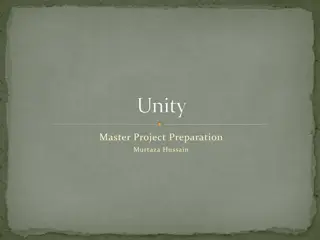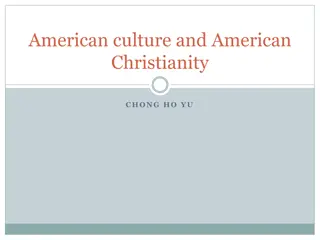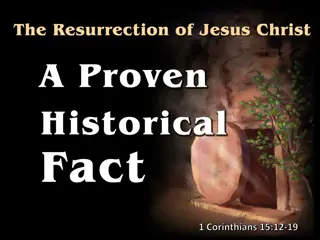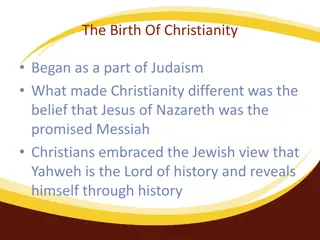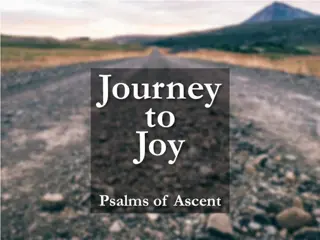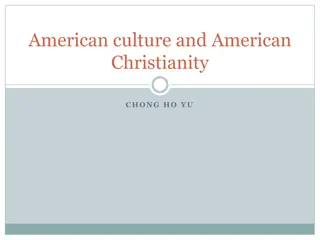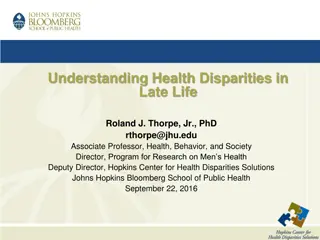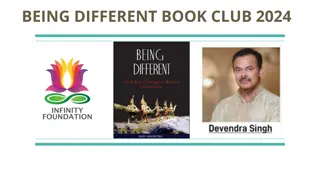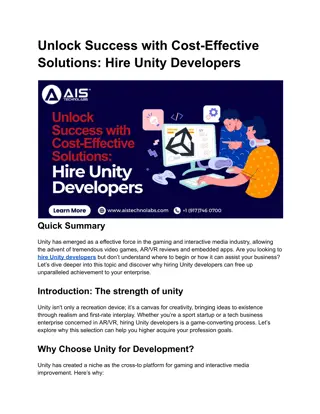
Self-Consciousness and the Search for Meaning in Human Existence
Explore how self-consciousness evolved in humans, giving rise to existential anxiety and the quest for meaning. Religion emerges as a response to this anxiety, while individuals navigate their unique journeys in finding personal significance.
Download Presentation

Please find below an Image/Link to download the presentation.
The content on the website is provided AS IS for your information and personal use only. It may not be sold, licensed, or shared on other websites without obtaining consent from the author. If you encounter any issues during the download, it is possible that the publisher has removed the file from their server.
You are allowed to download the files provided on this website for personal or commercial use, subject to the condition that they are used lawfully. All files are the property of their respective owners.
The content on the website is provided AS IS for your information and personal use only. It may not be sold, licensed, or shared on other websites without obtaining consent from the author.
E N D
Presentation Transcript
Unity Is March 24, 2017
Self-consciousness As the realization of mortality grew in humans, a dreadful sense of anxiety gripped them. Tillich s shock of nonbeing and Freud s trauma of self-consciousness had come into existence, and these awakenings brought to humans the knowledge that they were distinct, in some sense separate from the rest of the world. Because of their new knowledge, humans would never again identify themselves completely with the natural world. They now experienced their selfhood as that which stood over against their world. Spong, John Shelby. A New Christianity for a New World (p. 42). HarperCollins. Kindle Edition.
A need for meaning Both the shortness and the uncertainty of human life became operative existential realities that could be contemplated abstractly and anticipated consciously. Simultaneously in these newly self- conscious creatures a tremendous need was born to find meaning, permanence, and stability in a world that suddenly seemed meaningless, transitory, and destabilized. Spong, John Shelby. A New Christianity for a New World (p. 42). HarperCollins. Kindle Edition.
Self-consciousness, angst, and human survival Had these creatures, our ancient human ancestors, not learned to cope with the angst accompanying self-consciousness, that consciousness would have proved to be an ineffective evolutionary step, for no creature can live with chronic, unrelieved angst and survive. Indeed, I suspect that in those early years of human history the issue of survival for those humans who had achieved this evolutionary breakthrough was very much in doubt. Spong, John Shelby. A New Christianity for a New World (pp. 42-43). HarperCollins. Kindle Edition.
Religion, with its evolving myths (stories developed to convey meaning) became the human response to existential anxiety
From Christian Healing Jesus was Himself a parable. His life was an allegory of the experiences that man passes through in developing from natural to spiritual consciousness; hence the Bible and the prophets can be understood only by those who arrive at that place in consciousness where the writers were when they gave forth their messages. It requires the same inspiration to read the Scriptures with understanding that it required originally to receive and write them.
Each persons life is his/her own personal parable, his/her own search for meaning.
Unity Is UNITY IS A link in the great educational movement inaugurated by Jesus Christ; our objective is to discern the truth in Christianity and prove it. The truth that we teach is not new, neither do we claim special revelations or discovery of new religious principles. Our purpose is to help and teach mankind to use and prove the eternal Truth taught by the Master. Charles Fillmore, founder of Unity
Christian diversity All this diversity of belief and practice, and the intolerance that occasionally results, makes it difficult to know whether we should think of Christianity as one thing or lots of things, whether we should speak of Christianity or Christianities. What could be more diverse than this variegated phenomenon, Christianity in the modern world'? In fact, there may be an answer: Christianity in the ancient world. As historians have come to realize, during the first three Christian centuries, the practices and beliefs found among people who called themselves Christian were so varied that the differences between Roman Catholics, Primitive Baptists, and Seventh-Day Adventists pale by comparison. Bart D. Ehrman. Lost Christianities: The Battles for Scripture and the Faiths We Never Knew (Kindle Locations 89-90). Kindle Edition.
Early friction in the Christian community. Galatians 1:6-9 6I am astonished that you are so quickly deserting the one who called you in the grace of Christ and are turning to a different gospel 7not that there is another gospel, but there are some who are confusing you and want to pervert the gospel of Christ. 8But even if we or an angel from heaven should proclaim to you a gospel contrary to what we proclaimed to you, let that one be accursed!9As we have said before, so now I repeat, if anyone proclaims to you a gospel contrary to what you received, let that one be accursed!
How does one identify a disciple of Jesus? John 13:34-35 34I give you a new commandment, that you love one another. Just as I have loved you, you also should love one another.35 By this everyone will know that you are my disciples, if you have love for one another.
Origen a third century metaphysical Christian Origen, whose creative attempts to explore the relationship of God and Christ based on a full understanding of scriptural revelation led him to conclude that Christ was a created being who was ultimately subordinate to God the Father, even if in substance he was the Word and Wisdom of God because of his intimate connection with and infusion by the Father in eternity past. But Origen's subordinationist Christology, along with his notion of the preexistence of human souls and of the ultimate salvation of all beings, including the devil, led eventually to his condemnation as a heretic. Bart D. Ehrman. Lost Christianities: The Battles for Scripture and the Faiths We Never Knew (Kindle Locations 4047-4051). Kindle Edition.
What did Christianity mean to Charles Fillmore?
Why Unity withdrew from INTA in 1922 The Unity School has from the beginning stood for certain religious ideals which the New Thought people have not adopted. We have proclaimed Jesus Christ as the head of our work, and have so notified the world by putting the word Christian into the name of our organization. This the I.N.T.A. has refused to do, although it claims to carry out Christian principles. When we advocated a change of name to include the word Christian the proposal was quickly hushed up in the executive board meeting. The argument was that, although I.NT.A. was a Christian movement, it should not put anything in its name to antagonize non-Christians who might otherwise be induced to join (Vahle, The Unity Movement: Its Evolution and Spiritual Teaching)
Charles Fillmore also wrote, in the same article: Unity teaches that the eternal life taught and demonstrated by Jesus is not gained by dying, but by refining the body until it becomes the undying habitation of the soul. This refinement of the body requires the renunciation of certain sense habits and appetites, such as the lust for meat, tobacco, stimulants, sex, coarse dances, and all pleasures that exalt sense above soul. Unity teaches that to gain the spiritual life man must sacrifice the animal life, He that loseth his life for my sake shall find it. New Thought people do not advocate the renunciation of sense life in order to gain eternal life. They teach that man goes on to higher fields of action by dying. We hold that Christianity, rightly understood, teaches a science by which life can be attained here and now, and that dying is a loss instead of a gain.
While regeneration is still taught as part of Unity metaphysics, it hasn t been taught from this austere perspective since Charles and Myrtle s time. Even the writings of Lowell Fillmore do not reflect this level of austerity.
Spong, John Shelby. A New Christianity for a New World (p. 230-232). HarperCollins. Kindle Edition. So why does it matter that we reformulate the tenets of traditional Christianity or attempt to redefine God in nontheistic terms? What is the answer to the So what? question from my critical listener? We reimage God to keep the world from enduring the pain of a continuing reliance on a theistic deity. The same paternalistic, protective God who offers feeble humanity comfort in theism is the deity alleged to have supported burning critics at the stake or fighting brutal wars to impose a particular version of divinity on other people. That same theistic God is quoted by people who want to impose their definitions of homosexuality or their values in the right-to-life movement on everyone else. So it matters how one thinks of God.
Spong, John Shelby. A New Christianity for a New World (pp. 230-232). HarperCollins. Kindle Edition. We need a reformation in our thinking about God not to give people a comfortable God-figure that they can keep in the God-room of their home a room that they enter periodically to do God-things. No, we need a reformation so that the ecclesia of the future will invite people into the realm of God, where they can act corporately to enhance life, to expand love, and to encourage being. It matters. God matters. The realm of God matters. The ecclesia matters. The reformation matters. When someone next asks me to respond to the So what? question, I shall be prepared.
Unity Is UNITY IS A link in the great educational movement inaugurated by Jesus Christ; our objective is to discern the truth in Christianity and prove it. The truth that we teach is not new, neither do we claim special revelations or discovery of new religious principles. Our purpose is to help and teach mankind to use and prove the eternal Truth taught by the Master. Charles Fillmore, founder of Unity


